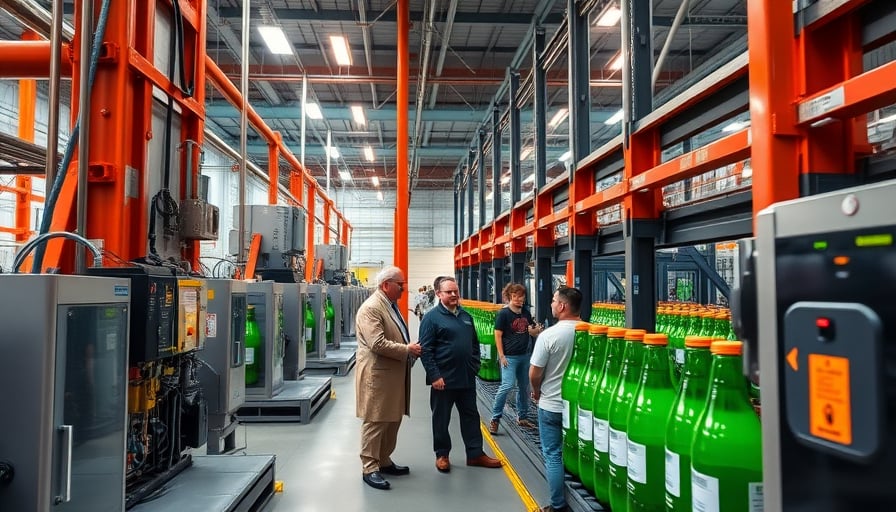Corporate News
Coca‑Cola HBC AG, listed on the London Stock Exchange, has announced a significant expansion of its Lisburn bottling facility, investing roughly €31 million to increase production capacity. The move follows a broader investment in a new bottling line in Northern Ireland, underscoring the company’s ongoing commitment to expanding its footprint in the UK region.
The company’s share price has shown modest upward movement in recent trading, with a noted rise of just under two percent on the day of the investment announcement. Dividend policy remains stable, with a modest yield that aligns with the firm’s long‑term return strategy.
Overall, the company continues to strengthen its operational base while maintaining a steady market presence, reflecting a cautious yet steady approach to growth in the competitive beverage sector.
A Digital‑Physical Retail Synergy
The expansion of Coca‑Cola HBC AG’s Lisburn bottling plant illustrates a broader industry trend: the blending of digital transformation with traditional physical retail infrastructure. While e‑commerce and mobile ordering continue to grow, the beverage sector still relies heavily on efficient supply chains and localized production. By investing in a new bottling line, the company positions itself to meet the demands of an increasingly fragmented retail landscape, where consumers expect both convenience and authenticity.
Digital data analytics will likely play a pivotal role in the new facility. Real‑time monitoring of production processes can reduce waste, optimize energy usage, and improve traceability—features that resonate with a generation that values sustainability and transparency. Moreover, the facility’s proximity to major distribution hubs in Northern Ireland facilitates quicker delivery times to retailers and consumers, enabling dynamic pricing strategies that align with fluctuating demand patterns captured through digital platforms.
Generational Spending Patterns and Market Segmentation
Demographic shifts are reshaping how brands allocate resources. Millennials and Gen Z, who constitute a larger share of disposable income than older cohorts, increasingly favor experiential consumption over pure product ownership. They are drawn to brands that offer personalized, immersive interactions—whether through augmented reality experiences at pop‑up events or curated product bundles delivered via subscription models.
Coca‑Cola HBC AG’s investment in capacity expansion can be interpreted as a strategic response to these spending patterns. By ensuring a robust supply of flagship beverages, the company can support experiential initiatives such as branded kiosks, limited‑edition flavor releases, or collaborative campaigns with local artists. These initiatives create touchpoints that transcend the physical bottle, turning consumption into a cultural statement.
Simultaneously, the firm’s stable dividend policy continues to appeal to older investors who prioritize income stability. Thus, the company balances the divergent expectations of multiple generational cohorts, safeguarding long‑term shareholder value while nurturing innovation that resonates with younger consumers.
The Evolution of Consumer Experiences
Consumer experience is no longer confined to the point of sale. Post‑purchase engagement—through loyalty apps, interactive packaging, or community events—has become essential for brand differentiation. Digital transformation enables brands to gather granular data on usage patterns, enabling tailored marketing messages and product development cycles.
The new bottling line will support such initiatives by allowing rapid scale‑up of niche product lines, thereby reducing time‑to‑market for new flavor concepts or sustainability‑focused packaging solutions. By integrating Internet‑of‑Things (IoT) sensors, the facility can feed consumption data back to the corporate headquarters, informing predictive analytics that align production with emerging trends. This agile loop ensures that Coca‑Cola HBC AG remains attuned to the shifting preferences of an increasingly discerning consumer base.
Forward‑Looking Market Opportunities
Sustainability‑Driven Packaging The expansion provides capacity to test and roll out recyclable or biodegradable bottle formats, meeting regulatory pressures and consumer demand for environmentally responsible products.
Localized Product Innovation With higher production flexibility, the firm can experiment with regional flavor profiles, leveraging local ingredients to create “taste‑local” experiences that enhance brand authenticity.
Data‑Powered Supply Chain Optimization Integrating real‑time production data with demand forecasting platforms can reduce inventory holding costs and improve shelf availability, especially during peak retail periods.
Cross‑Channel Marketing Synergies The facility’s output can be paired with digital marketing campaigns that drive traffic to both online platforms and physical retail outlets, creating a seamless omni‑channel experience.
Enhanced Stakeholder Engagement Transparent reporting on production metrics—made possible by digital integration—can strengthen investor confidence and attract ESG‑focused capital.
In summary, Coca‑Cola HBC AG’s €31 million investment in the Lisburn bottling facility exemplifies how traditional beverage companies are leveraging digital tools to enhance physical operations. By aligning capacity expansion with shifting generational preferences, sustainability imperatives, and the evolving nature of consumer experience, the firm positions itself to capture emerging opportunities in a competitive and rapidly changing market.
